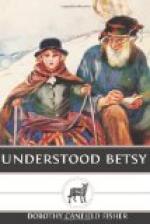Uncle Henry said, “Oh!” and stopped asking questions. Aunt Abigail turned away and put a stick of wood in the stove. Elizabeth Ann did not feel very superior now, and when Aunt Abigail said, “Now the butter’s beginning to come. Don’t you want to watch and see everything I do, so’s you can answer if anybody asks you how butter is made?” Elizabeth Ann understood perfectly what was in Aunt’s Abigail’s mind, and gave to the process of butter-making a more alert and aroused attention than she had ever before given to anything. It was so interesting, too, that in no time she forgot why she was watching, and was absorbed in the fascinations of the dairy for their own sake.
She looked in the churn as Aunt Abigail unscrewed the top, and saw the thick, sour cream separating into buttermilk and tiny golden particles. “It’s gathering,” said Aunt Abigail, screwing the lid back on. “Father’ll churn it a little more till it really comes. And you and I will scald the wooden butter things and get everything ready. You’d better take that apron there to keep your dress clean.”
Wouldn’t Aunt Frances have been astonished if she could have looked in on Elizabeth Ann that very first morning of her stay at the hateful Putney Farm and have seen her wrapped in a gingham apron, her face bright with interest, trotting here and there in the stone-floored milk-room! She was allowed the excitement of pulling out the plug from the bottom of the churn, and dodged back hastily to escape the gush of buttermilk spouting into the pail held by Aunt Abigail. And she poured the water in to wash the butter, and screwed on the top herself, and, again all herself (for Uncle Henry had gone off as soon as the butter had “come"), swung the barrel back and forth six or seven times to swish the water all through the particles of butter. She even helped Aunt Abigail scoop out the great yellow lumps—her imagination had never conceived of so much butter in all the world! Then Aunt Abigail let her run the curiously shaped wooden butter-worker back and forth over the butter, squeezing out the water, and then pile it up again with her wooden paddle into a mound of gold. She weighed out the salt needed on the scales, and was very much surprised to find that there really is such a thing as an ounce. She had never met it before outside the pages of her arithmetic book and she didn’t know it lived anywhere else.
After the salt was worked in she watched Aunt Abigail’s deft, wrinkled old hands make pats and rolls. It looked like the greatest fun, and too easy for anything; and when Aunt Abigail asked her if she wouldn’t like to make up the last half-pound into a pat for dinner, she took up the wooden paddle confidently. And then she got one of the surprises that Putney Farm seemed to have for her. She discovered that her hands didn’t seem to belong to her at all, that her fingers were all thumbs, that she didn’t seem to know in the least beforehand how hard a stroke




